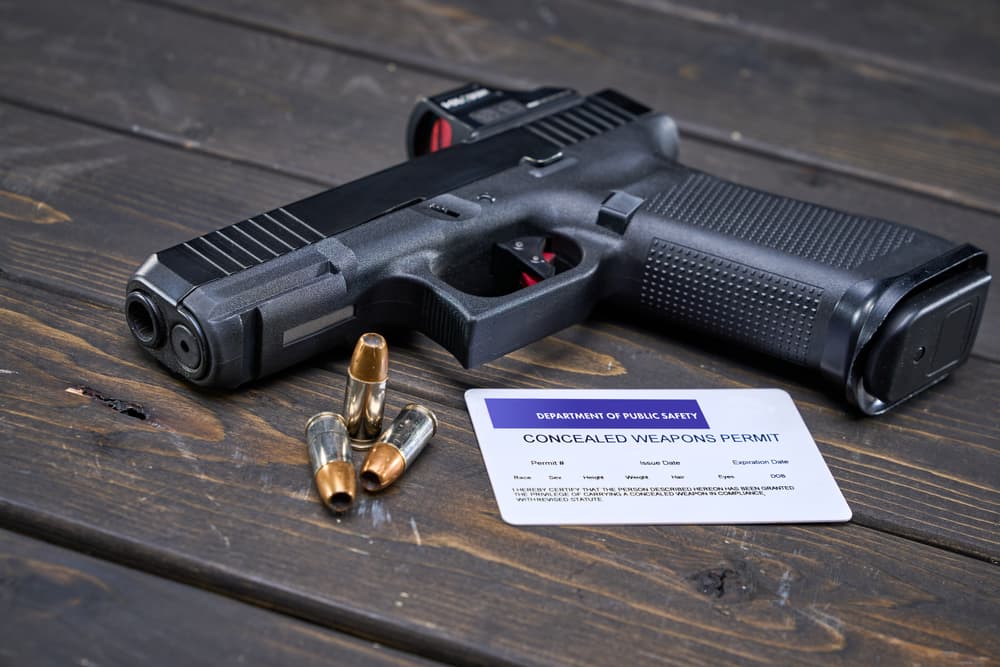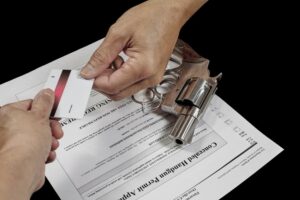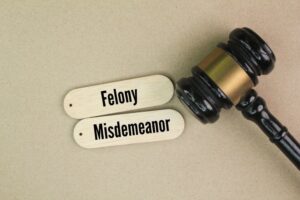Do I Need a Permit to Carry a Gun in Los Angeles?

Yes, you must have a valid Concealed Carry Weapon (CCW) license to carry a handgun, whether loaded or unloaded, on your person or in your vehicle in Los Angeles. Recent court decisions made these permits more accessible than in the past, but state and local laws have also created a complex web of restrictions on where you may carry.
The process involves a detailed application, a thorough background check, and mandatory training. Any misstep may lead to denial or, worse, criminal charges.
If you have a question about your eligibility or face issues during the application process, the Rodriguez Law Group is here to help. Call us at (213) 995-6767.
Key Takeaways for Carrying a Gun in Los Angeles
- A Concealed Carry Weapon (CCW) permit is mandatory to carry a handgun in Los Angeles. This requirement applies whether the firearm is loaded or unloaded and covers carrying it on your person or in your vehicle.
- The subjective “good cause” requirement was eliminated by the Supreme Court. This means Los Angeles authorities must issue a permit if you meet all objective legal criteria, making permits more accessible.
- California law designates numerous “sensitive places” where firearms are prohibited. Even with a valid CCW permit, carrying a gun is illegal in locations like schools, government buildings, bars, and public parks.
The Ground Has Shifted: How a Supreme Court Case Changed Gun Permits in LA
For decades, obtaining a CCW in Los Angeles was nearly impossible for the average citizen. California law allowed issuing agencies like the LAPD and Los Angeles County Sheriff’s Department (LASD) to require applicants to show “good cause”—a specific, documented threat above and beyond a general desire for self-defense. This standard was subjective and difficult for most people to meet.
This “good cause” requirement created a system where very few people could legally carry a firearm for personal protection outside their homes. The rules were typically unclear and inconsistently applied, leading to widespread confusion and frustration among law-abiding gun owners.
In 2022, the U.S. Supreme Court’s landmark decision in New York State Rifle & Pistol Association, Inc. v. Bruen declared that subjective “good cause” requirements are unconstitutional.
- What this means for you: Los Angeles no longer denies your application simply because you don’t have a documented, specific threat against you. If you meet the objective legal criteria, the issuing agency is now required to issue a permit. This has opened the door for many more law-abiding citizens to obtain a CCW.
- The State’s Response: In response to the Bruen decision, California enacted new laws, including stricter training requirements and a longer list of “sensitive places” where firearms are prohibited, even with a valid permit. These new laws are themselves being challenged in court, creating a fluid and confusing legal environment.
As a result of these changes, both the LAPD and the LASD have overhauled their application processes and are dealing with a significant surge in applications. This means you may experience longer wait times, but the evaluation itself is now a more straightforward, criteria-based process.
How Do I Apply for a CCW Permit in Los Angeles? A Step-by-Step Guide
The application process is handled by either the police chief of your city (like the LAPD) or the Los Angeles County Sheriff’s Department if you live in an unincorporated area.
Step 1: Determine Your Eligibility
 Before you apply, you must meet several key requirements. You must:
Before you apply, you must meet several key requirements. You must:
- Be of good moral character: This is now judged by your history. A criminal record, a history of domestic violence, or other specific legal issues may disqualify you.
- Be a resident of Los Angeles County: You will need to provide proof of residency, such as a recent utility bill. (Note: As of April 2025, a process for non-California residents is now available, though it has separate requirements).
- Not be a “disqualified person”: California Penal Code § 26202 lists numerous reasons a person is prohibited from owning or possessing a firearm. These include any felony conviction, certain misdemeanor convictions, and having been involuntarily committed to a mental health facility.
Step 2: Complete the Application
You must fill out the standard California CCW application form truthfully and completely. Any false statements lead to an automatic denial of your application and potential criminal charges for perjury.
Step 3: Undergo a Thorough Background Check
This is a deep dive into your personal history. The background check includes:
- A review of local, state, and federal criminal records.
- Checks of mental health records.
- An in-person interview with an investigator.
Step 4: Complete the Mandatory Firearms Training
As of 2024, California law requires a mandatory training course from an instructor approved by your issuing agency.
- Length: New applicants must complete a course that is a minimum of 16 hours long.
- Content: The course covers firearm safety, handling, marksmanship, and the laws regarding the permissible use of a firearm and lethal force.
- Approved Provider: You must take the course from an instructor approved by the agency you are applying to (e.g., an LASD-approved vendor). You should not enroll in a training course until you are specifically instructed to do so by the CCW unit.
By carefully preparing your documents, being truthful in your application, and successfully completing the required training, you put yourself in a strong position for your CCW application to be approved.
Start by visiting the website of your local issuing agency—either the LAPD or the LASD—to download the official application and see their list of approved training providers.
I Have My Permit. So, Where Can’t I Carry My Gun?
Receiving your CCW permit is a significant responsibility, not a license to carry everywhere. California has designated numerous locations as “sensitive places” where carrying a firearm is illegal, even with a valid permit.
The list of these restricted places is long, and ongoing court battles mean the rules change with little notice. For example, a Ninth Circuit Court decision has impacted the enforcement of some of these restrictions, creating an evolving legal landscape. Mistakenly carrying your firearm in one of these zones could result in the revocation of your permit and new criminal charges.
You must know and abide by these restrictions at all times. As of late 2025, under California Penal Code § 26230, you are generally prohibited from carrying in the following places:
- Government and Judicial Buildings: This includes courthouses, police stations, and any building used for government meetings.
- Polling Places.
- Schools and Universities: K-12 schools, colleges, and any school-related activity.
- Child Care Facilities.
- Airports: Specifically, past the security screening checkpoints.
- Bars and Restaurants that Serve Alcohol: Any establishment whose primary business is serving alcohol for on-site consumption.
- Public Transit: Buses, trains, and other forms of public transportation.
- Public Parks and Playgrounds.
- Federal Buildings: Such as post offices and federal courthouses.
- Any private property where the owner has posted signs prohibiting firearms.
If you are ever unsure about the legality of carrying in a specific location, it is safer to err on the side of caution.
What Are the Penalties for Carrying a Gun Without a Permit in LA?
Carrying a concealed firearm without a valid CCW permit is a serious crime in California. The specific charge and potential penalties depend on the circumstances of the case.
Carrying a Concealed Firearm (Penal Code § 25400)
 This is the primary charge for unlawfully carrying a concealed weapon.
This is the primary charge for unlawfully carrying a concealed weapon.
- As a misdemeanor: For a first offense with no aggravating factors, this charge results in up to one year in county jail and a fine of up to $1,000.
- As a felony: The charge is elevated to a felony if you have a prior felony conviction, the firearm was stolen, or you are associated with a criminal street gang. A felony conviction carries a sentence of up to three years in state prison.
Carrying a Loaded Firearm in Public (Penal Code § 25850)
This is a separate offense that is commonly charged in addition to carrying a concealed weapon if the gun is loaded.
- Similar to the concealed carry charge, this is filed as either a misdemeanor or a felony. A misdemeanor conviction carries up to a year in county jail, while a felony results in up to three years in prison.
A conviction for unlawful carry will not only lead to jail time and fines but will also strip you of your Second Amendment rights. This makes you a “disqualified person” who may never legally own a firearm or obtain a CCW permit in the future.
Where Can You Carry a Gun Without a Permit in California?
California law doesn’t just regulate when you can carry a gun. It also controls how you transport it, even if you’re not trying to carry it on your person. This is where things get confusing for gun owners who are trying to follow the rules. So let’s break it down.
Can You Transport a Gun in Your Car Without a CCW?
Yes, but only if you follow very specific rules. Under California Penal Code § 25610, you may legally transport a handgun without a permit as long as:
- The firearm is unloaded
- It’s locked in a secure container (like a hard case or the trunk—not the glove box)
- You are legally allowed to own firearms
That last point matters. If you’re prohibited from owning a gun (for example, because of a felony conviction), you can’t legally transport one, even if it’s unloaded and locked up.
What About Rifles and Shotguns?
Long guns (rifles and shotguns) don’t need to be in a locked container, but they must still be unloaded when transported in a vehicle. If they’re loaded, or if ammunition is easily accessible, you could be charged with carrying a loaded firearm in public under Penal Code § 25850.
Can You Carry To and From a Range, Gunsmith, or Hunting Trip?
Yes, the law makes some exceptions. You’re allowed to carry or transport firearms to:
- A licensed gun range
- A gunsmith
- A hunting area, if you’re legally licensed and actively engaged in hunting
Even in these scenarios, the gun must still be unloaded and properly stored while in transit.
If you’re unsure about how the law applies to your situation, it’s better to ask questions before putting yourself at risk. A small mistake, like leaving ammunition in the same bag as your handgun, can lead to serious charges.
Frequently Asked Questions About Los Angeles Gun Permits
How long does the CCW application process take in Los Angeles?
Due to the surge in applications following the Bruen decision, wait times are lengthy. It is not uncommon for the process to take several months from the date of submission to the final decision.
Does a CCW permit from another state work in California?
No. California does not recognize or offer reciprocity for concealed carry permits issued by any other state. You must have a California-issued CCW to legally carry a concealed firearm here.
Do I need to tell a police officer I am carrying a firearm if I am stopped?
While California does not have a statewide “duty to inform” law, it is generally advisable to calmly and respectfully inform the officer that you have a CCW permit and are carrying a firearm. Some individual issuing agencies may even require it as a condition of your permit. Always follow the officer’s instructions carefully.
How long is a Los Angeles CCW permit valid for?
An initial CCW permit in California is typically valid for two years. Renewal applications require an updated background check and a shorter, 8-hour training course.
Can I carry a concealed firearm while using marijuana?
No. Although recreational marijuana is legal in California, it remains illegal under federal law. The Bureau of Alcohol, Tobacco, Firearms and Explosives (ATF) considers any user of marijuana to be an “unlawful user of a controlled substance,” which prohibits them from possessing a firearm. Using marijuana while in possession of a firearm is a crime and will result in the revocation of your CCW permit.
Secure Your Rights Responsibly with the Rodriguez Law Group
The laws surrounding your right to carry a firearm are more complex than ever. You do not have to figure them out alone. The sooner we review your situation, the better we protect your rights.
If you have questions about obtaining a CCW or are facing a weapons charge in Los Angeles, call the Rodriguez Law Group today at (213) 995-6767.


